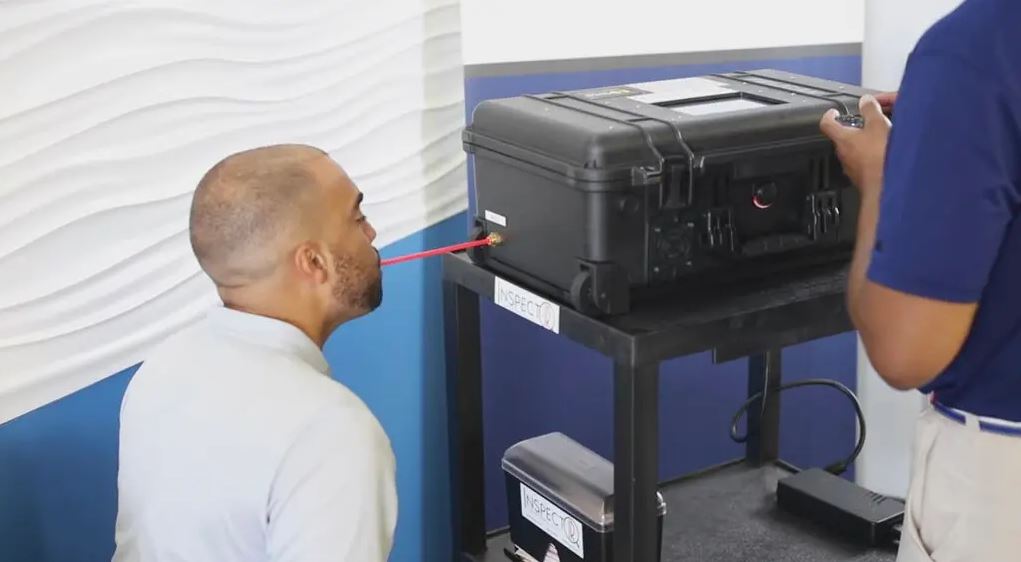UC Davis researcher Cristina Davis, who has been working on her own coronavirus test, said: “I think this is an extremely exciting development for the entire field of breath analysis.” Davis is the associate vice chancellor for Interdisciplinary Research and Strategic Initiatives at UC Davis and has been working on her own coronavirus test. “This represents a significant step forward.”
Breath tests, on the other hand, continue to present real-world issues, and this specific technology has significant practical limits, according to the experts. Although the equipment necessary to carry out the tests is enormous (it is roughly the size of a carry-on luggage), it can only be used by qualified operators who are under the supervision of health care specialists.
According to InspectIR Systems, a tiny, five-person firm situated in Frisco, Texas, a large number of devices would be required for large-scale screening due to the limited processing capacity of each machine, which can only handle roughly 20 samples per hour.
Although the firm claimed excellent accuracy rates for its tests, several experts stated they needed to see the data that supported its application to the Food and Drug Administration (F.D.A.) before recommending this test technique.
Apart from that, a large number of health-care facilities and mobile testing locations where the devices may be employed have already embraced various types of fast tests that are now widely accessible. Officials from InspectIR said that final price arrangements had not yet been finalised.
According to John Redmond, a co-founder of InspectIR Systems, it might take 10 to 12 weeks for the first devices to enter the marketplace. According to the Food and Drug Administration, the business said that it aimed to create around 100 devices each week, although it was not immediately apparent when manufacturing would reach that level.
The molecules we exhale are altered by many diseases, and there has long been interest in creating breath tests for a broad variety of ailments, from lung cancer to liver disease.
Many scientists and companies have been working on developing breath-based coronavirus tests, which could be used to quickly and noninvasively screen large groups of people for the virus since the outbreak began. Since the outbreak began, numerous research teams have been trying to identify unique chemical patterns in the breath of Covid patients.
According to documents released by the Food and Drug Administration, the breathalyser had a sensitivity of 91 percent in a company-sponsored study of 2,409 asymptomatic people. This means that of the people who tested positive for the virus on a P.C.R. test, the device flagged 91 percent of them as presumptive positives, according to the documents. It had a specificity of 99 percent, which means that it did not identify any evidence of the virus in 99 percent of persons who had obtained a negative result from a P.C.R. test.
Professor Susan Butler-Wu, of the Keck School of Medicine at the University of Southern California, said that she would want to see more independent data on the device’s effectiveness, as well as more specifics on the chemicals it was identifying in the future.
According to experts, some foods and chemicals might cause a false positive on a breath test. In addition, the InspectIR Breathalyzer’s instructions state that persons should refrain from eating, drinking, or using any tobacco products in the 15 minutes before to undergoing the examination. It is recommended that those who test positive have their results validated by a P.C.R. or other equivalent test, according to the manufacturer.
The most potential use of breath testing is as a rapid screening tool, Dr. Lam said, a more accurate version of the unreliable temperature screens that were widespread during the epidemic. According to him, when it comes to breath testing, “they don’t actually offer you a diagnosis.” “They provide you with a metabolic pattern that is compatible with the condition,” says the researcher.
Health care institutions and enterprises that operate mobile or pop-up testing locations are among the types of businesses that InspectIR plans to lease the analyzers to. It is possible that they may be used to test passengers at airports or employees in an office building, according to the co-founders, who also said that major sports leagues and corporations in the travel sector have already shown interest.
Pricing for the gadget has not yet been determined, but the co-founders said on Friday that they aim to be able to provide licences or subscriptions that convert to a cost of around $10 to $12 each test in the near future.
As of today, the firm has received $2.7 million in funding, and Pfeiffer Vacuum will serve as its first production partner, according to the company.

